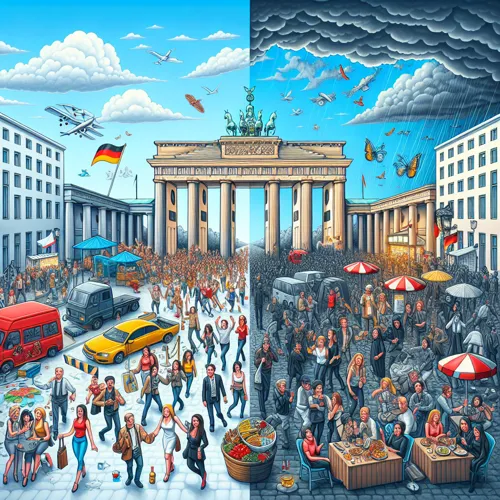Berlin, the vibrant and chaotic capital of Germany, is a place that ignites strong emotions in those who experience it. The city, marked by a tumultuous history that spans from the fall of the Berlin Wall to the present day, continues to polarize opinions with its gritty charm and bohemian allure.
The Historical Trauma:
Berlin is not immune to the emotional scars inflicted upon it during WWII and the subsequent division. As a result, it can be both a haunting reminder of past atrocities and an inspiration for rebirth, as seen through the revival of once-neglected neighborhoods such as Kreuzberg and Neulölln.
The Creative Community:
Berlin’s thriving art scene is another aspect that draws people to the city, offering a plethora of galleries, street art installations, and avant-garde performances for enthusiasts to explore. However, this influx of creatives can also create tension between longtime residents and newcomers, contributing to feelings of disdain toward those who benefit from the cultural boom.
The Cultural Diversity:
Home to one of the most significant immigrant populations in Germany, Berlin celebrates its multiculturalism through a myriad of festivals and events that highlight various cuisines, traditions, and art forms. Yet this embrace of diversity can also lead to misunderstandings or clashes within communities, perpetuating negative views of the city.
The Urban Landscape:
Berlin’s diverse architecture reflects its turbulent past, ranging from historic landmarks like the Brandenburg Gate and Reichstag Building to crumbling East Berlin remnants that remain as stark reminders of its tumultuous history. For some, these contrasting elements create a unique allure; for others, they signify a lack of urban planning or foresight.
The Social Dynamics:
As the hub of political discourse in Germany, Berlin attracts people from all walks of life seeking a progressive lifestyle and greater personal freedom. This vibrant social scene can be both empowering and overwhelming, sparking varying opinions about the city’s capacity to support its diverse inhabitants.
The Culinary Delights:
Lastly, no discussion of Berlin would be complete without mentioning its eclectic food scene. From traditional currywurst stands to modern fusion cuisine, foodies will find themselves spoiled for choice in this city that revels in its culinary adventures.
In conclusion
Berlin is a microcosm of Germany’s rich history and vibrant future, capturing both the hearts and minds of those who visit while simultaneously repelling others with its grit and urban challenges. Love it or hate it - there is no denying that Berlin remains a captivating enigma within Europe’s ever-evolving landscape
